
hearing.rexton.com
BiCore C R-Li
BiCore C R-Li T
RECHARGEABLE
HEARING AIDS
USER GUIDE 2
(INSTRUCTIONS FOR USE)
)

2
CAUTION
It is important to read this user guide and the user
guide 1 (safety manual) thoroughly and completely.
Follow the safety information to avoid damage or
injury.
This User Guide is valid for:
Hearing
BiCore C R-Li
BiCore C R-Li T
Charger
Charging Station R (RIC)
Travel Charger BiCore R
Intended purpose
Hearing aids are intended to improve the hearing of
hearing impaired persons. Diagnosis and prescription
of a hearing aid mu be performed by hearing
health specialis, e.g. acouicians, audiologis or
ENT doctors.
The charger is intended to charge our specic hearing
aids with built‑in power cells (lithium‑ion rechargeable
batteries).
Use the hearing aids and accessories only as described
in the user guide.

3
Content
Welcome 5
Your hearing aids 6
Hearing aid type 6
Getting to know your hearing aids 7
Components and names 8
Controls 11
Hearing programs 12
Daily use 13
Inserting and removing the hearing aids 13
Turning on and o 18
Switching to andby mode 19
Adjuing the volume 19
Changing the hearing program 20
Charging with the Standard Charger 21
Charging with the Travel Charger 23
Special liening situations 30
On the phone 30
Audio reaming with iPhone 31
Audio reaming with Android phone 31
Bluetooth 31
Audio induction loop (BiCore C R‑Li T only) 32

4
Maintenance and care 33
Hearing aids 33
Ear pieces 35
Professional maintenance 37
Important safety information for hearing aids
and charger 38
Personal safety 39
Product safety 40
Safety information on lithium‑ion rechargeable
batteries 41
Further information 44
Accessories 44
Operating, transport, and orage conditions for
the hearing aid 44
Operating, transport, and orage conditions for
the charger 46
Technical data of the power supply adapter 47
Disposal information 47
Troubleshooting for hearing aid 48
Troubleshooting for charger 49
Symbols used in this document 50
Conformance information for the charger 51
Country‑specic information 52
Service and warranty 55

5
Welcome
Thank you for choosing our hearing aids to accompany
you through everyday life. Like anything new, it may take
you a little time to become familiar with them.
This guide, along with support from your Hearing Care
Professional, will help you underand the advantages
and greater quality of life your hearing aids oer.
To receive the mo benet from your hearing aids, it is
recommended that you wear them every day, all day.
This will help you get adjued to them.
The device may not look exactly like the guiding
illurations in these inructions. We reserve the
right to make any changes we consider necessary.
Before using your hearing aids for the r time,
fully charge them. Follow the inructions in the
charger's user guide.

6
Your hearing aids
This user guide describes optional features that
your hearing aids may or may not have.
Ask your Hearing Care Professional to indicate the
features that are valid for your hearing aids.
Hearing aid type
Your hearing aids are a RIC (Receiver-in-Canal) model.
The receiver is placed within the ear canal and connected
to the hearing aid via a receiver cable. The hearing aids
are not intended for children under the age of 3 years or
persons with a developmental age of under 3 years.
A power cell (lithium‑ion rechargeable battery) is
permanently built into your hearing aid. This enables
easy charging with Charging Station R.
The wireless functionality enables advanced audiological
features and synchronization between your two hearing
aids.
Your hearing aids feature Bluetooth® Low Energy* technology allowing for easy data exchange with your
* The Bluetooth word mark and logos are owned by the Bluetooth SIG, Inc., and any
use of such marks by WS Audiology Denmark A/S of this product is under licenses.
Other trademarks and trade names are those of their respective owners.

7
Your hearing aids feature Bluetooth® low energy*
technology allowing for easy data exchange with your
smartphone, and for seamless audio reaming with your
iPhone* and for some Android smartphones that support
Audio Streaming for Hearing Aids (ASHA).
Getting to know your hearing aids
It is recommended to familiarize yourself with your new
hearing aids. With the hearing aids in your hand try
using the controls and note their location on the hearing
aid. This will make it easier for you to feel and press the
controls while wearing the hearing aids.
If you have problems pressing the controls of your
hearing aids while wearing them, you can ask
your Hearing Care Professional whether a remote
control or a smartphone app to control your hearing
aids is available.
* iPad, iPhone, and iPod touch are trademarks of Apple Inc., regiered in the U.S.
and other countries.

8
Components and names
➊Ear piece
➋Receiver
➌Receiver cable
➍Microphone
openings
➎Rocker switch (control,
on/o switch)
➏Side indicator (red = right,
blue = left) and receiver
connection
➐Charging contacts

9
Travel Charger
➎
➊Removable silicone lining
➋Charging slots
➌Hearing aid LEDs
➍Charger LED
➎Push button
➏Power port
➐USB power cable
➑Power adapter
Standard Charger
➌
➊Status LEDs
➋Charging slots
➌Non‑detachable USB power cable
➍Power adapter

10
You can use the following andard ear pieces:
Standard ear pieces Size
Sleeve 3.0 Vented/Closed/
Power
Eartip 3.0 Open
Eartip 3.0 Tulip
You can easily exchange the andard ear pieces. Read
more in section “Maintenance and care”.
Cuom-made ear pieces
Earmold 3.0

11
Controls
With the rocker switch you can, for example, switch
hearing programs. The Hearing Care Professional has
programmed your desired functions to the rocker switch.
Rocker switch function L R
Press briey:
Program up/down
Volume up/down
TV ream on/o
Press for about 2 seconds:
Program up/down
Volume up/down
TV ream on/o
Press for more than 3 seconds:
Turn on/o
L = Left, R = Right
You can also use a remote control to change
hearing programs and adju the volume of your
hearing aids. With our smartphone app you have
even more control options.

12
Hearing programs
1
2
3
4
5
6
Read more in section “Changing the hearing program”.

13
Daily use
To assure comfortable and easy use of your hearing aids
they are equipped with an onboard control element.
In addition, we oer an app for Android as well as
iPhones which makes handling your devices even easier.
Contact your Hearing Care Professional for downloading
and inalling the smartphone app.
Inserting and removing the hearing aids
Your hearing aids have been ne‑tuned for your right and
left ear. Colored markers indicate the
side:
● red marker = right ear
● blue marker = left ear
Inserting a hearing aid:
XFor Sleeves, take care that the bend of the Sleeve is
in line with the bend of the receiver cable.
See the following illurations.

14
Correct:
Incorrect:
XHold the receiver cable at the bend closer to the
ear piece.
XCarefully push the ear piece in
the ear canal ➊.
XTwi it slightly until it sits well.
Open and close your mouth to
avoid accumulation of air in the
ear canal.
XLift the hearing aid and slide it
over the top of your ear ➋.
➋

15
CAUTION
Risk of injury!
XAlways wear the receiver cable with an ear
piece.
XMake sure that the ear piece is completely
attached.
CAUTION
Risk of injury!
XInsert the ear piece carefully and not too deeply
into the ear.
CAUTION
Risk of injury!
XIn very rare cases the ear piece could remain
in your ear when removing the hearing aid. If
this happens, have the ear piece removed by a
medical professional.
● It may be helpful to insert the right hearing aid
with the right hand and the left hearing aid with
the left hand.
● If you have problems inserting the ear piece,
use the other hand to gently pull your earlobe
downwards. This opens the ear canal and eases
insertion of the ear piece.

16
The optional retention rand helps to securely retain the
ear piece in your ear. To attach the optional retention
rand:
XAlign the end of the retention rand with the at end of
the receiver.
XThen press the retention rand towards the receiver
until it clicks into place.

17
To position the retention rand:
XBend the retention rand and
position it carefully into the
bottom of the bowl of your ear
(refer to the picture).
Removing a hearing aid:
XLift the hearing aid and slide it
over the top of your ear ➊.
XIf your hearing aid is equipped
with a cuom shell or a mold,
remove it by pulling the small
removal cord toward the back
of your head.
XFor all other ear pieces: Grip the receiver in the
ear canal with two ngers and pull it carefully out ➋.
Do not pull the receiver cable.
Clean and dry your hearing aids after usage. Read more
in section “Maintenance and care”.

18
Turning on and off
You have the following options to turn your hearing aids
on or o.
Via charger:
XTurning on: Take the hearing aids out of the charger.
The artup melody is played in your hearing aids. The
default volume and hearing program are set.
XTurning o: Place the hearing aids in the charger.
Note that the charger mu be connected to the power
supply. For details refer to the charger's user guide.
Via rocker switch:
XTurning on: Press and hold the lower
part of the rocker switch until the
artup melody arts to play. Release
the rocker switch while the melody is
playing.
The default volume and hearing
program are set.
XTurning o: Press and hold upper
or lower part of the rocker switch
for several seconds. A power down
melody is played.

19
Switching to andby mode
Via remote control, you can switch your hearing aids to
andby mode. This mutes the hearing aids. When you
leave andby mode, the previously used volume and
hearing program are set.
Note:
● In andby mode, the hearing aids are not turned o
completely. They draw some power.
Therefore we recommend to use andby mode only
for a short period of time.
● If you want to leave andby mode, but the remote
control is not at hand: Turn your hearing aids o and
on again (via rocker switch or by shortly placing them
in the charger until the LEDs light up). In this case, the
default volume and hearing program are set.
Adjuing the volume
Your hearing aids automatically adju the volume to the
liening situation.
XIf you prefer manual volume adjument, press the
upper part of the rocker switch to increase the volume
or press the lower part to decrease the volume.
Refer to section “Controls” for the setting of your
rocker switch.
An optional signal can indicate the volume change. Once
the maximum or minimum volume has been reached, you
may hear an optional signal tone.

20
Changing the hearing program
Depending on the liening situation, your hearing aids
automatically adju their sound.
Your hearing aids may also have several hearing
programs which allow you to change the sound, if
needed. An optional signal tone can indicate the program
change.
XTo change the hearing program, press the rocker
switch briey.
Refer to section “Controls” for the setting of the rocker
switch. Refer to section “Hearing programs” for a li of
your hearing programs.
The default volume is applied.
Page is loading ...
Page is loading ...
Page is loading ...
Page is loading ...
Page is loading ...
Page is loading ...
Page is loading ...
Page is loading ...
Page is loading ...
Page is loading ...
Page is loading ...
Page is loading ...
Page is loading ...
Page is loading ...
Page is loading ...
Page is loading ...
Page is loading ...
Page is loading ...
Page is loading ...
Page is loading ...
Page is loading ...
Page is loading ...
Page is loading ...
Page is loading ...
Page is loading ...
Page is loading ...
Page is loading ...
Page is loading ...
Page is loading ...
Page is loading ...
Page is loading ...
Page is loading ...
Page is loading ...
Page is loading ...
Page is loading ...
Page is loading ...
-
 1
1
-
 2
2
-
 3
3
-
 4
4
-
 5
5
-
 6
6
-
 7
7
-
 8
8
-
 9
9
-
 10
10
-
 11
11
-
 12
12
-
 13
13
-
 14
14
-
 15
15
-
 16
16
-
 17
17
-
 18
18
-
 19
19
-
 20
20
-
 21
21
-
 22
22
-
 23
23
-
 24
24
-
 25
25
-
 26
26
-
 27
27
-
 28
28
-
 29
29
-
 30
30
-
 31
31
-
 32
32
-
 33
33
-
 34
34
-
 35
35
-
 36
36
-
 37
37
-
 38
38
-
 39
39
-
 40
40
-
 41
41
-
 42
42
-
 43
43
-
 44
44
-
 45
45
-
 46
46
-
 47
47
-
 48
48
-
 49
49
-
 50
50
-
 51
51
-
 52
52
-
 53
53
-
 54
54
-
 55
55
-
 56
56
REXTON KIT BiCore C R-Li User guide
- Type
- User guide
- This manual is also suitable for
Ask a question and I''ll find the answer in the document
Finding information in a document is now easier with AI
Related papers
-
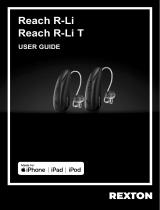 REXTON Reach R-Li 30 User guide
REXTON Reach R-Li 30 User guide
-
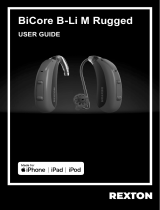 REXTON BiCore B-Li M Rugged 40 User guide
REXTON BiCore B-Li M Rugged 40 User guide
-
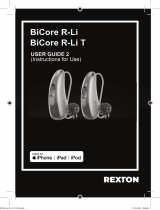 REXTON BiCore R-Li 80 User guide
REXTON BiCore R-Li 80 User guide
-
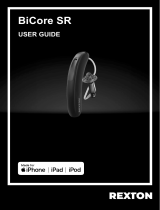 REXTON BiCore SR SDemo User guide
REXTON BiCore SR SDemo User guide
-
 REXTON KIT Reach R-Li 80 User guide
REXTON KIT Reach R-Li 80 User guide
-
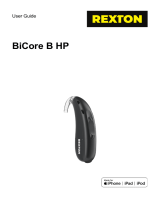 REXTON BiCore B HP 30 User guide
REXTON BiCore B HP 30 User guide
-
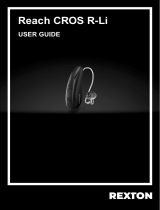 REXTON Reach CROS R-Li User guide
REXTON Reach CROS R-Li User guide
-
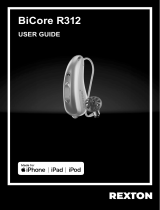 REXTON BiCore R312 60 User guide
REXTON BiCore R312 60 User guide
-
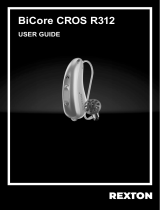 REXTON BiCore CROS R312 User guide
REXTON BiCore CROS R312 User guide
-
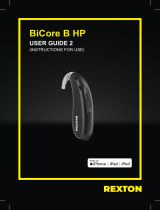 REXTON BiCore B HP 30 User guide
REXTON BiCore B HP 30 User guide
Other documents
-
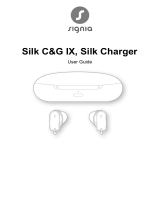 Signia KIT Silk C&G sDemo DIX User guide
Signia KIT Silk C&G sDemo DIX User guide
-
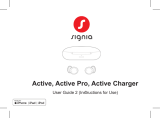 Signia Active User guide
Signia Active User guide
-
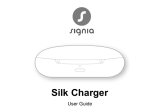 Signia Silk Charger User guide
Signia Silk Charger User guide
-
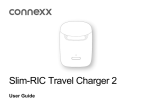 connexx Slim-RIC Travel Charger 2 User guide
connexx Slim-RIC Travel Charger 2 User guide
-
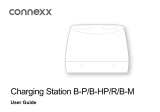 connexx Charging Station R User guide
connexx Charging Station R User guide
-
Widex WPP401 User guide
-
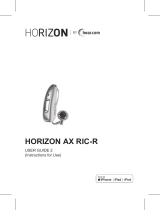 HEAR.COM HORIZON 7AX RIC-R User guide
HEAR.COM HORIZON 7AX RIC-R User guide
-
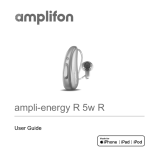 AMPLIFON ampli-energy R 4 5w R User guide
AMPLIFON ampli-energy R 4 5w R User guide
-
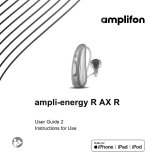 AMPLIFON ampli-energy R 4 AX R User guide
AMPLIFON ampli-energy R 4 AX R User guide
-
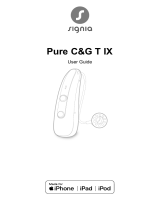 Signia Pure C&G T 5IX User guide
Signia Pure C&G T 5IX User guide










































































